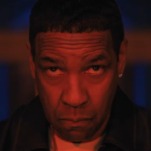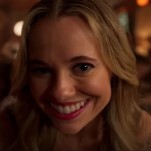Grace Gealey and the Divine Push Towards Empire
With each new set of series premieres, it becomes more and more clear that this Golden Age of television is here to stay awhile. FOX’s new hit drama Empire is one of many shows to come with the prestige of an esteemed film director at its head, and co-creator Lee Daniels has woven an intense family drama that everyone is buzzing about. The show has already been renewed for a second season, and while some critics, including our own, find the plot to be more soapy than necessary at times, many of us agree that it’s hard to look away from these characters, and the King Lear-inspired narrative that’s unfolding.
While actors like Taraji P. Henson, Gabourey Sidibe, and Terrence Howard bring familiar faces to Empire, newcomer Grace Gealey brings an extensive theatre background and an infectious excitement about her role as Anika Calhoun. For Gealey, who had no previous television work, this opportunity must be attributed to something bigger than herself, or mere beginner’s luck. Paste caught up with the actor to talk about her role on the series (which she likens to Robin Wright’s on Claire Underwood House of Cards), working with Academy Award-nominee Taraji P. Henson, and why everyone—including those who’ve been critical of the series so far—should keep watching Empire.
Paste Magazine: First off, congratulations on your network television debut! Not too shabby, right?
Grace Gealey: Thank you! What a way to come out.
Paste: Can you talk about how you landed on such a highly-anticipated series?
Gealey: I honestly believe in a force that’s larger than our own. I believe the divine had a lot to do with it. I was not a huge name. I wasn’t SAG, I didn’t even have a reel. I moved to Chicago from New York, three months before booking this. I wanted a break, and just needed some time to rejuvenate myself, and still audition in the meantime. Because Empire was shooting in Chicago, they opened up the Chicago talent pool to audition. I submitted a tape, and Lee took a look, and flew down to Chicago to check out a few callbacks and screen tests that I was a part of. I got the role about two days later.
Paste: Even though much of this is new to you, I know you have an extensive background in theatre. What’s it been like transitioning from live performance to TV?
Gealey: The biggest difference for me has been the fact that, even though you have scripts of each episode for television, you don’t have the entire season in front of you. With a play or even a film, you see the script from beginning to end, so there’s a certain understanding you have of the character’s arc. The other big thing for me has been working out of succession, for camera. For theatre, when you have a climactic moment, you’ve normally worked the moments before that, to get to that climax and to discover exactly what that looks like. You don’t really get that luxury with TV (laughs). So it’s a different challenge, but an exciting one. I’m working with a bunch of tour de forces who are helping me assimilate into that world.
-

-

-

-

-

-

-

-

-

-

-

-

-

-

-

-

-

-

-

-

-

-

-

-

-

-

-

-

-

-

-

-

-

-

-

-

-

-

-

-








































